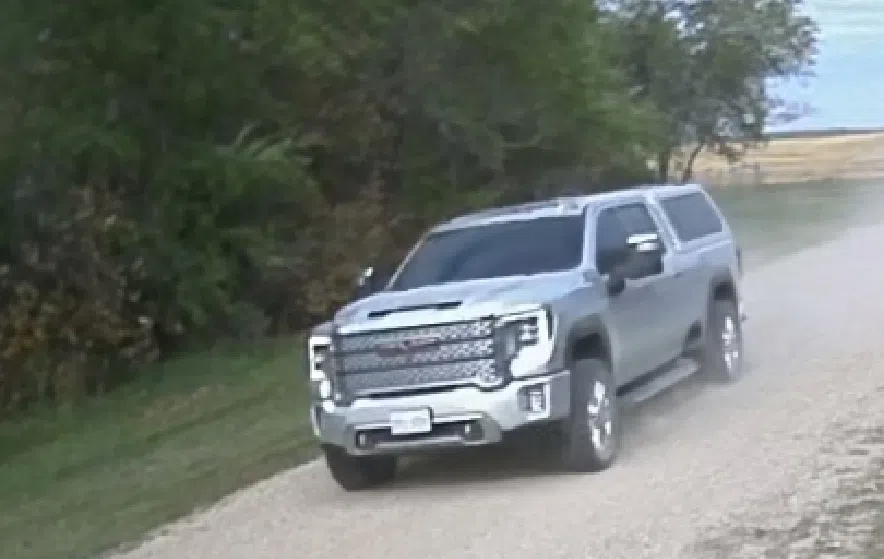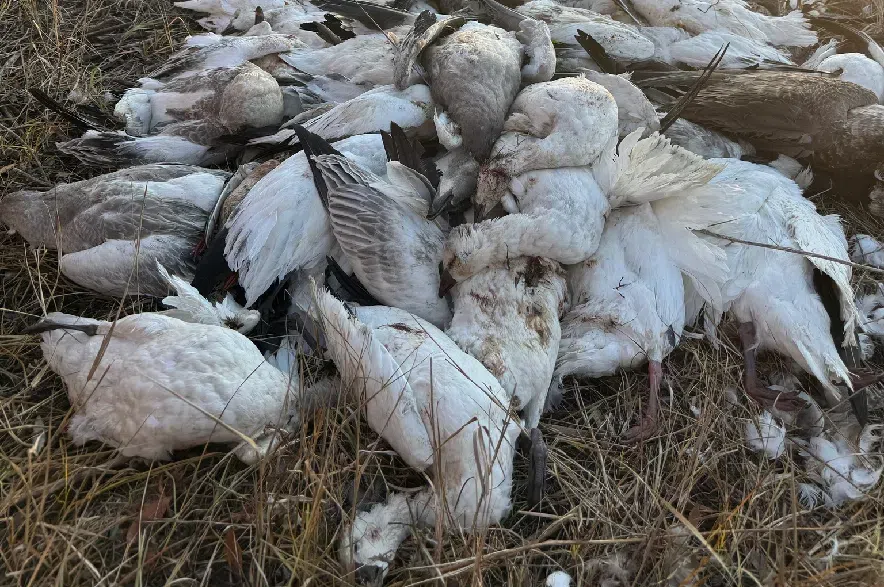Saskatchewan conservation officers are on the hunt for the people who dumped more than 100 dead migratory birds near Patience Lake earlier this month.
According to SaskTIP, conservation officers received a call on Thursday, reporting that 142 dead migratory birds had been found on a piece of private land roughly 30 kilometres southeast of Saskatoon. When the officers arrived, they found a collection of different species of waterfowl such as snow geese, Canada geese and a variety of ducks. All had been left intact, with the edible meat left to rot.
Read more:
- Hunter calls Sask. elk hunt reckless, province defends move
- Rolling the dice: Inside a Saskatchewan outfitter’s daily hunt
- Man sentenced for illegal outfitting in Wilkie area: CPPS
- ‘Very disheartening’: Concern grows after sick, dead geese found in Regina park
Chris Maier, an inspector with Saskatchewan’s Conservation Officer Service, said that while the case may seem shocking, incidents like this one happen more frequently than he’d like.
“I wouldn’t say it’s a common occurrence, but it happens too often. It’s not something that we like to see as conservation officers, but also, as most of us are sportsmen, we don’t like to see any animals being wasted,” Maier said.
“A hundred and forty-two birds is a pretty decent number. It’s not the largest one we’ve ever had, but it is very high, with a lot of birds being dumped and wasted.”
Asked why someone would leave 142 birds to rot and go to waste, Maier said it’s usually a simple answer.
“I would speculate that a majority of it happens due to laziness,” he said.
“The easiest part of the hunt is when you’re actually pulling the trigger and dealing with the hunt itself. It’s after any hunt where the work begins… If you harvest any animal, that’s where you have to get down and dirty and do all the cleaning and get everything ready to go.”
According to Darrell Crabbe, executive director of the Saskatchewan Wildlife Federation, Alberta and Manitoba have dealt with issues like this in the past, and made changes to their hunting rules as a result.
“Manitoba and Alberta have put restrictions on the length of time that a non-resident can hunt in that province for migratory birds, which was due to illegal outfitting, over-harvesting and that sort of thing, and it’s pretty much put a complete stop to it in those two provinces,” he said.
“Most of those players are now in Saskatchewan, because the province or the government has not deemed it an issue that they feel should be dealt with,” Crabbe added.
“We ourselves, and the Saskatchewan outfitting organizations, have been lobbying the government for well over a year now to adopt a term license for non-resident hunters for migratory birds, and until they do, this is going to continue to be a problem.”
According to SaskTIP, dumping the game animals “constitutes a provincial and federal offence.”
Maier said that catching those responsible for dumping animals can be a difficult task. It forces officers to use every tool at their disposal, including appealing to the public for help.
“I’d like to say we catch all of our guys, all of our poachers, but unfortunately we don’t,” Maier said.
“But the public is definitely the one that we rely on to help us out as much as we can, just because we can’t be everywhere on the landscape at the same time.”
When it comes to this case, however, Maier said he’s feeling optimistic.
“I’m confident that we’ll have a very good lead to identify the subject by the end of it,” he said.
“Laying the charges might be tricky, just if we can track the individual down, that will be the biggest thing. But I have a good feeling about this one, that we’ll be able to track or identify the subject down the road here.”

According to Sasktip, conservation officers are asking the public for assistance identifying the owner of this vehicle. (Sasktip/Facebook)
According to SaskTIP, conservation officers are asking for help from the public identifying the owner of a silver vehicle that may have been involved in the dumping, and anyone with information on the vehicle or the people involved was asked to call the provincial Turn in Poachers and Polluters line.
SaskTIP said a cash reward of up to $2,000 is being offered for information that leads to the arrest and conviction of the person or persons involved in dumping the birds, and noted that callers can choose to remain anonymous if they wish.











